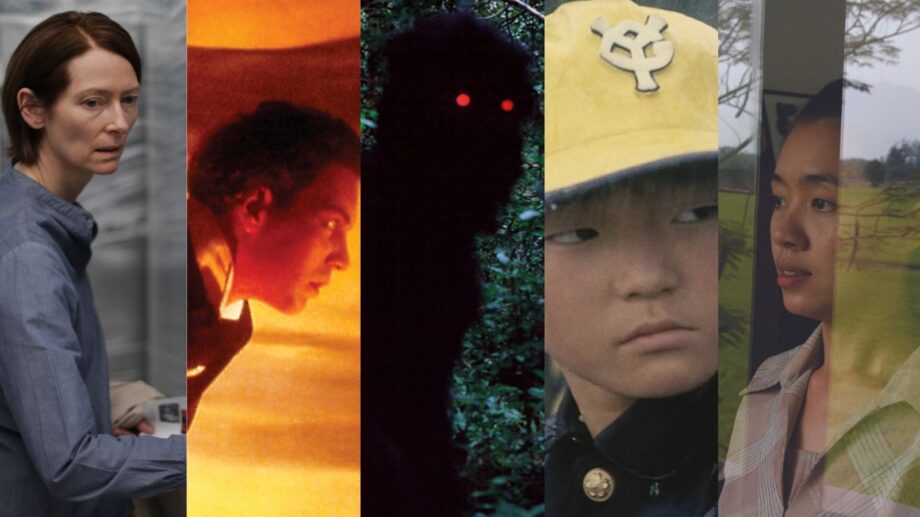Tickets are on sale now and going fast!
Film at Lincoln Center announces “The World of Apichatpong Weerasethakul,” a complete retrospective of the filmmaker’s career to date, including his rarely screened shorts, as well as a carte-blanche selection of films that made a mark on his incomparable imagination, with films by Frederick Wiseman, John Cassavetes, Shōhei Imamura, Abbas Kiarostami, and more. The series will run from May 4 through 14 and FLC will host Weerasethakul in-person for Q&As and introductions for select films.
Among the 21st century’s most essential artists, Apichatpong Weerasethakul has amassed a richly original and transcendently mesmerizing body of work that few filmmakers can match. From his feature debut, Mysterious Object at Noon (2000), to the Palme d’Or-winning Uncle Boonmee Who Can Recall His Past Lives (2010), to his metaphysical latest, Memoria (2021), Weerasethakul’s formally daring oeuvre is marked by a meticulously controlled sense of cinematic sensuality and a powerful, understated gift for locating the political within the everyday. A towering figure in both world cinema and the art world, Weerasethakul continues to work in short- and feature-length filmmaking, always manifesting an experimental desire to rethink the possibilities of the medium. A singular cinephile in his own right, Weerasethakul has engaged with film history in profound ways.
In addition to four programs of Weerasethakul’s shorts and seven of his features, his selection of films include Chantal Akerman’s La Captive, a hypnotic exploration of erotic obsession that circles around the very-strange-indeed relationship between the seemingly pliant Ariane (Sylvie Testud) and the disturbingly jealous Simon (Stanislas Merhar); Russ Meyer’s Faster, Pussycat! Kill! Kill!, an enduringly influential, black-and-white cult classic in which three go-go dancers tear across the California desert on a nihilistic crime spree, presented in 35mm; John Cassavetes’ Opening Night, a masterful psychodrama with Gena Rowlands in one of her finest performances, playing an aging stage star in the midst of preparing for a new role whose sense of self begins to crumble after she witnesses the car-accident death of an obsessive fan; and Primate, Frederick Wiseman’s 10th feature, chronicling the daily activities and experimental research undertaken by scientists at Atlanta’s Yerkes National Primate Research Center, presented in 16mm.
Organized by Florence Almozini, Dan Sullivan, and Apichatpong Weerasethakul. Special thanks to Jean Ma (Stanford University).
Acknowledgements:
UCLA Film & Television Archive; Cinémathèque Royale de Belgique; the Museum of Modern Art, New York.
Tickets are now on sale. Tickets are $17 for the General Public; $14 for Students, Seniors, and Persons with Disabilities; and $12 for FLC Members. See more and save with a 3+ Film Package (discount automatically applied in cart). All-Access Passes and Student All-Access Passes are now sold out!
FILMS & DESCRIPTIONS
All films will screen at the Walter Reade Theater (165 W. 65th St.) unless otherwise noted.
A full schedule can be found below.
Blissfully Yours
Apichatpong Weerasethakul, 2002, Thailand/France, 35mm, 125m
Thai and Burmese with English subtitles
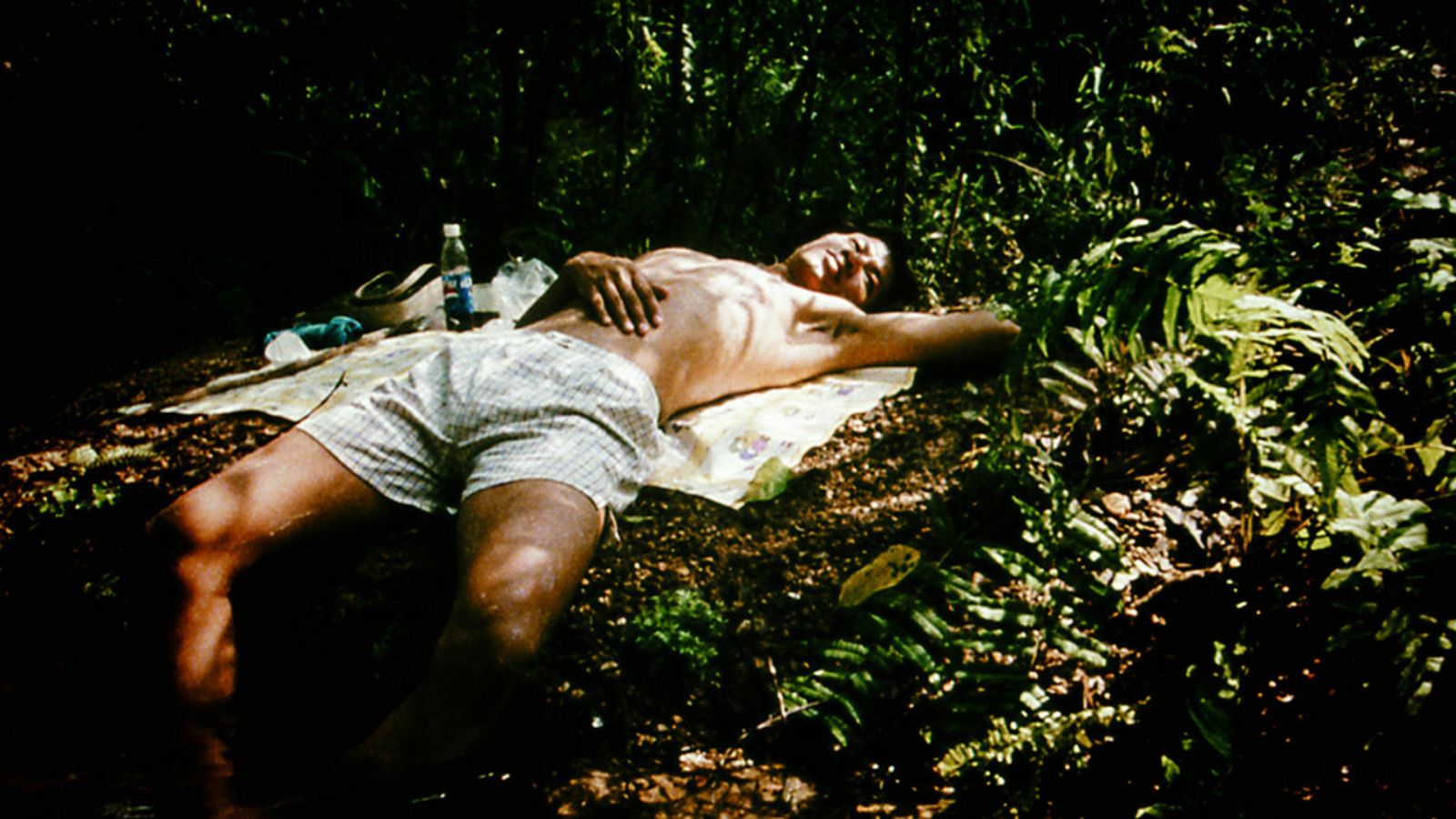
Blissfully Yours. Courtesy of Strand Releasing.
A mesmerizing and sensuous meditation on love and desire, Apichatpong’s second (and first fully fictional) feature film established him as one of world cinema’s most essential talents. The plot follows a romance between a Thai nurse and her boyfriend, an illegal immigrant from Myanmar, who go on a jungle picnic—with an older woman whom they both seem to know in hot pursuit. The tranquility of their date, enveloping and tender as it may initially seem, slowly recedes to reveal a more complex emotional picture, one marked by Apichatpong’s sophisticatedly low-key and true-feeling approach to rendering human desire. Print courtesy of the National Film and Sound Archive, Australia.
Friday, May 5 at 6:15pm (Q&A with Apichatpong Weerasethakul)
Cemetery of Splendor
Apichatpong Weerasethakul, 2015, Thailand/U.K./France/Germany/Malaysia, 122m
English and Thai with English subtitles
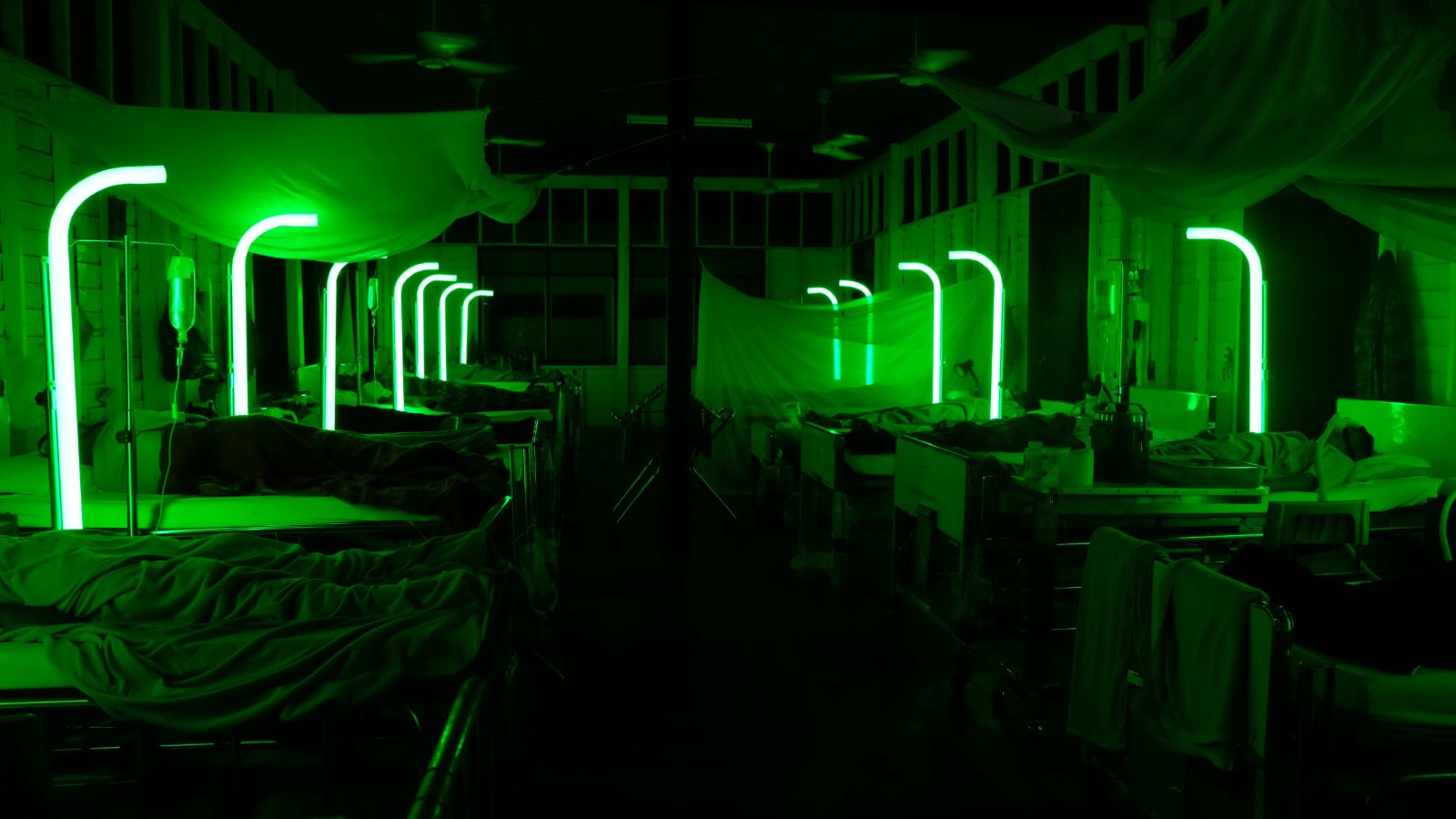
Cemetery of Splendour. Courtesy of Strand Releasing.
Apichatpong’s wondrous sixth feature is set in and around a hospital ward full of comatose soldiers. Attached to glowing dream machines and tended by a kindly volunteer (Jenjira Pongpas Widner) and a young clairvoyant (Jarinpattra Rueangram), the men are said to be waging war in their sleep on behalf of long-dead feuding kings, and their mysterious slumber provides a rich central metaphor: sleep as safe haven, as escape mechanism, as ignorance, as bliss. To slyer and sharper effect than ever, Apichatpong merges supernatural phenomena with Thailand’s historical phantoms and national traumas. Even more seamlessly than his previous films, this sun-dappled reverie induces a sensation of lucid dreaming, conjuring a haunted world where memory and myth intrude on physical space. An NYFF53 Main Slate selection.
Saturday, May 6 at 12:30pm
Memoria
Apichatpong Weerasethakul, 2021, Colombia/Thailand/U.K./France/Germany/Mexico/Qatar, 35mm, 136m
English and Spanish with English subtitles
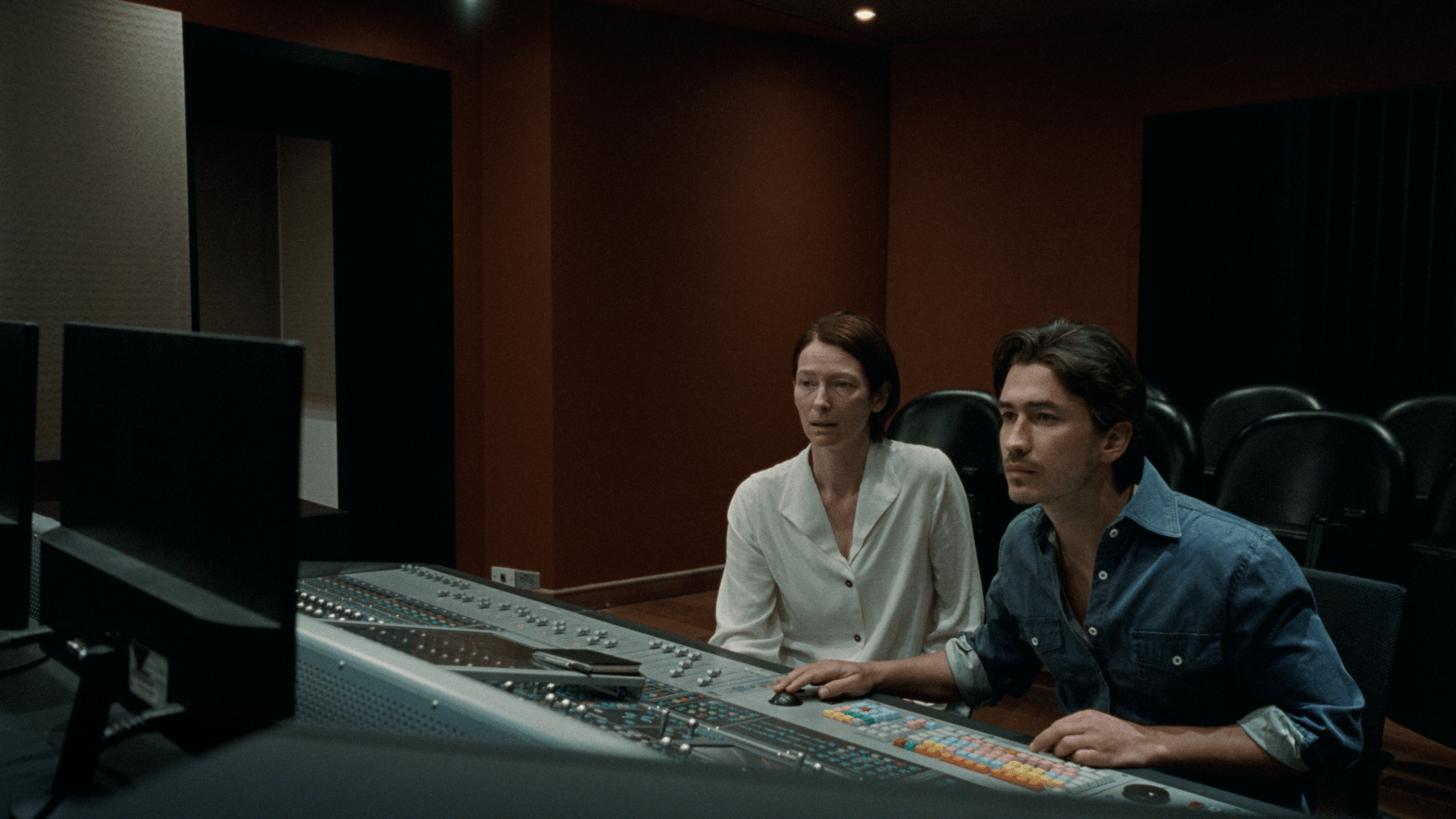
Memoria. Courtesy of NEON.
Collective and personal ghosts hover over every frame of Memoria, somehow the grandest yet most becalmed of Apichatpong’s works. Inspired by the Thai director’s own memories and those of people he encountered while traveling across Colombia, the film follows Jessica (a wholly immersed Tilda Swinton), an expat botanist visiting her hospitalized sister in Bogotá; while there, she becomes ever more disturbed by an abyssal sound that haunts her sleepless nights and bleary-eyed days, compelling her to seek help in identifying its origins. Thus begins a personal journey that’s also historical excavation, in a film of profound serenity that, like Jessica’s sound, lodges itself in the viewer’s brain as it traverses city and country. The climax is an extraordinary extended encounter with a rural farmer that takes place on a precipice between life and death. Winner of the Jury Prize at the 2021 Cannes Film Festival. An NYFF59 Main Slate selection.
Thursday, May 4 at 6:00pm (Q&A with Apichatpong Weerasethakul)
Saturday, May 13 at 6:00pm
Mysterious Object at Noon
Apichatpong Weerasethakul, 2000, Thailand/Netherlands, 89m
Thai with English subtitles
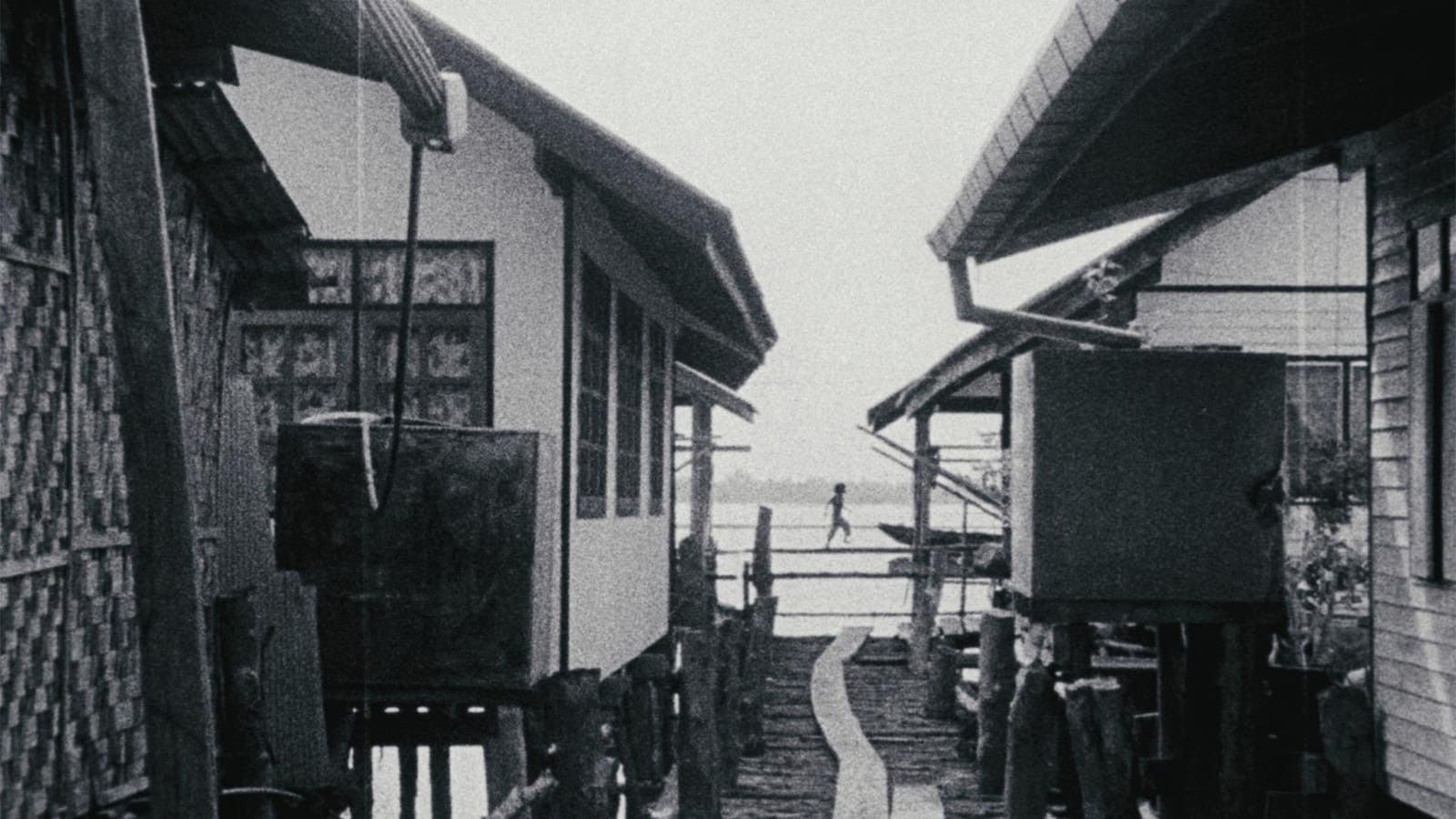
Mysterious Objects at Noon. Courtesy of Janus Films.
For his first feature, Apichatpong orchestrated this beguiling, sui generis hybrid: part road movie, part folk storytelling exercise, part surrealist party game. A camera crew travels the length of Thailand asking villagers to invent episodes in an ever-expanding story that ends up incorporating witches, tigers, surprise doublings, and impossible reversals. With each participant, Mysterious Object at Noon seems to take on new unresolved tension. Celebrating equally the possibilities of storytelling and of documentary, it’s a work that’s grounded in a very specific region, but feels like it came from another planet.
Saturday, May 6 at 5:30pm (Q&A with Apichatpong Weerasethakul)
Syndromes and a Century
Apichatpong Weerasethakul, 2006, Thailand/France/Australia, 35mm, 105m
Thai with English subtitles
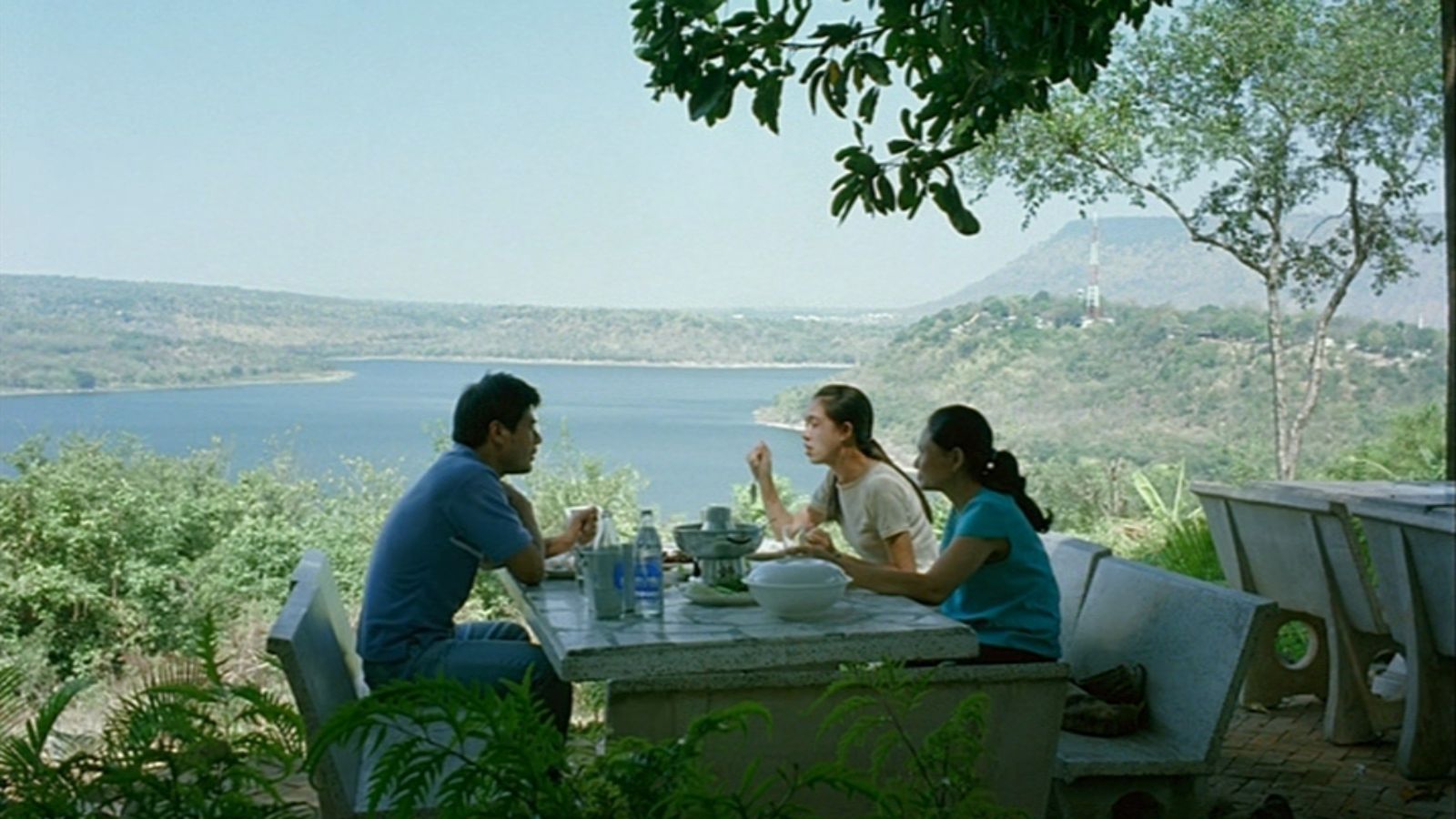
Syndromes and a Symphony. Courtesy of Strand Releasing.
Syndromes and a Century is an exploration of how people remember as well as a fictionalized account of the lives of Apichatpong’s parents before they became lovers. The film is broken into two distinct but analogous parts: one focusing on a female doctor in a small-town clinic, the other on a male doctor at a big city hospital. What unites the stories is Apichatpong’s superb eye for nuances of feeling and an alluring knack for finding marvelous moments, be it a droll Bangkok doctor boozing it up before she appears on TV or the exquisite poetry of villagers listening to a Thai country-western singer serenading the night. 35mm collection print courtesy of the UCLA Film & Television Archive. An NYFF44 Main Slate selection.
Tuesday, May 9 at 6:30pm
Tropical Malady
Apichatpong Weerasethakul, 2004, Thailand/France/Germany/Italy, 35mm, 118m
Thai with English subtitles
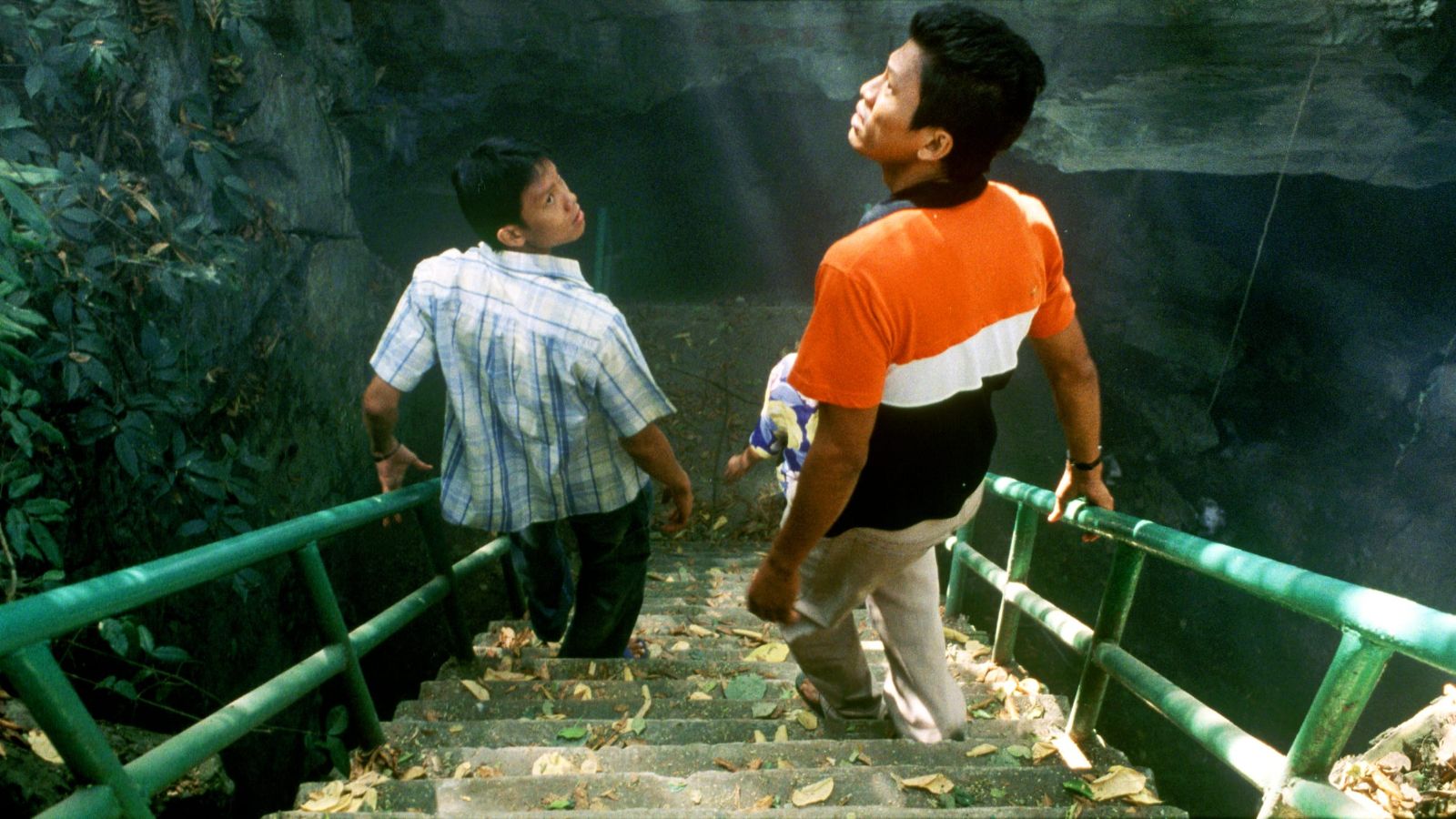
Apichatpong’s third feature, a haunting love story suffused with an air of myth, has endured as one of his signature films, and for good reason: winner of a Special Jury Prize at the 2004 Cannes Film Festival, the boldly bifurcated Tropical Malady is an astonishing work that is as sensual as it is mystical. The film’s narrative concerns a tender romance between a young Thai soldier and a boy from the country; when the boy mysteriously disappears—possibly because he has transformed into a tiger, per local hearsay—the soldier sets off into the jungle in search of his lover, inaugurating an intoxicating, sublime metaphysical journey to the very heart of desire itself. 35mm collection print courtesy of the UCLA Film & Television Archive. An NYFF42 Main Slate selection.
Friday, May 12 at 6:30pm
Uncle Boonmee Who Can Recall His Past Lives
Apichatpong Weerasethakul, 2010, Thailand/U.K./France/Spain/Germany/Netherlands, 114m
Thai, French, and Lao with English subtitles
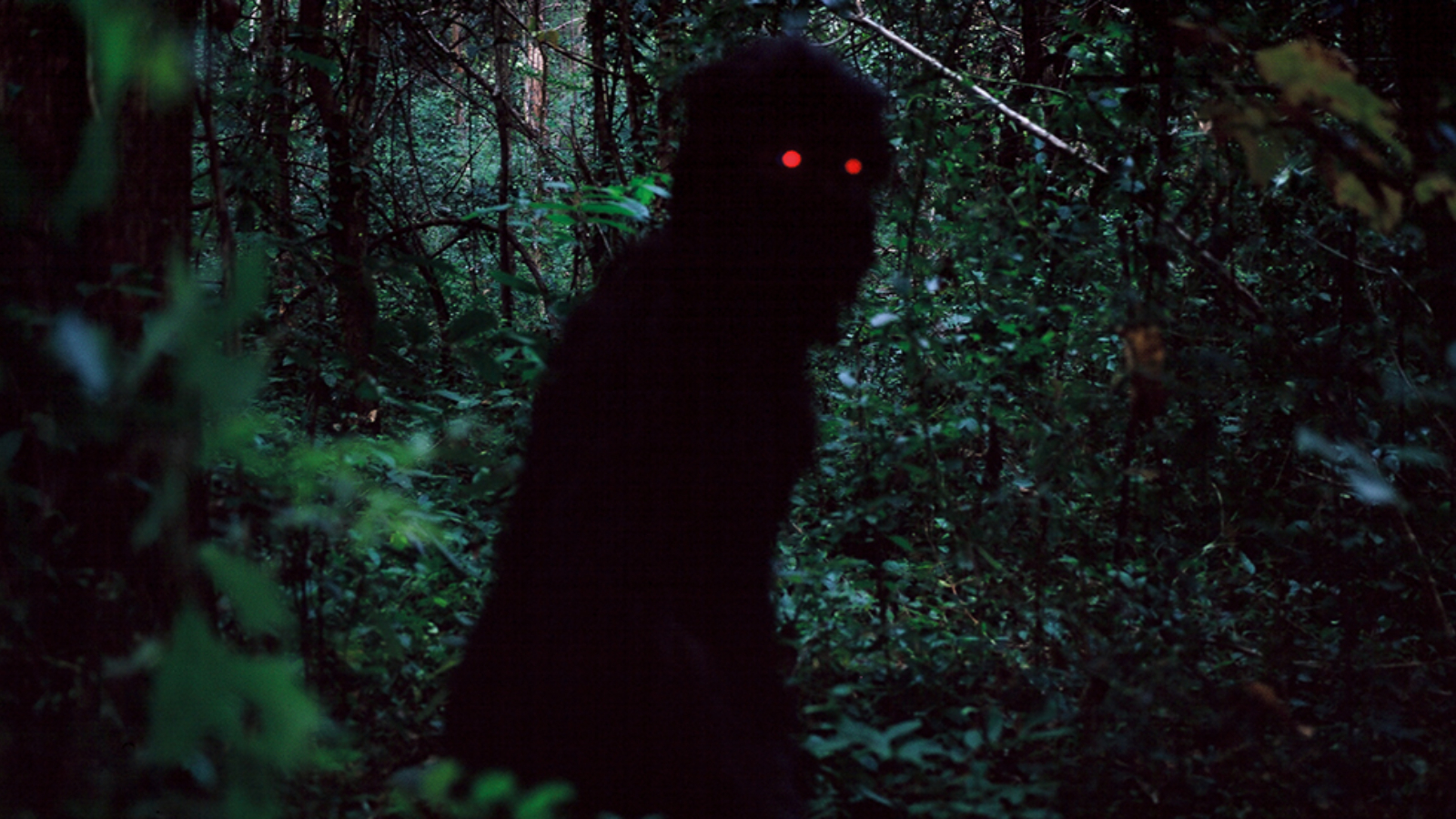
Uncle Boonmee Who Can Recall His Past Lives. Courtesy of Strand Releasing.
Apichatpong won the Palme d’Or at the 2010 Cannes Film Festival for this gently comic and wholly transporting tale of death and rebirth, set in Thailand’s rural northeast. Uncle Boonmee, a farmer suffering from kidney failure, is tended by loved ones and visited by the ghosts of his wife and son. As for his remembered past lives, they might—-or might not—-include a water buffalo, a disfigured princess, a talking catfish, and the insects whose chirps engulf the nighttime jungle scenes in this sensory immersion. Uncle Boonmee Who Can Recall His Past Lives is an otherworldly fable that lingers on earthly sensations, a film about a dying man that’s filled with mysterious signs of life. Apichatpong’s vision is above all a generous one: in the threat of extinction he sees the possibility of regeneration. An NYFF48 Main Slate selection.
Thursday, May 11 at 6:30pm
Shorts Program 1: Worldly River

The Anthem.
The Anthem
Apichatpong Weerasethakul, 2006, U.K./Thailand, 5m
A film that praises and blesses the theater and the screening to come.
La Punta
Apichatpong Weerasethakul, 2013, Thailand, 2m
Image and sound take on a contrapuntal relationship amid footage of a drive down a tree-lined road.
M Hotel
Apichatpong Weerasethakul, 2011, Thailand/Hong Kong, 12m
Two film crew members spend an afternoon taking portraits in a Hong Kong hotel.
Emerald
Apichatpong Weerasethakul, 2007, Thailand/Japan, 11m
Three actors recount their memories and dreams to bring new life to a defunct hotel.
Sakda (Rousseau)
Apichatpong Weerasethakul, 2012, Switzerland, 5m
A fragmentary essay about reincarnation and boundaries between memory and fantasy.
Mobile Men
Apichatpong Weerasethakul, 2008, Thailand, 4m
Two young men film each other while driving a pickup truck, dissolving into one another in the process.
Cactus River
Apichatpong Weerasethakul, 2012, Thailand, 10m
Apichatpong visits one of his actors and her new husband, crafting a diary of the visit and a record of nature’s ebbs and flows.
Cinetracts
Apichatpong Weerasethakul, 2020, USA, 2m
Produced for an omnibus film on filmmakers’ experience of the COVIDovid-19 pandemic (Cinetracts ’‘20 [2020]), Apichatpong’s contribution indexes a time and a place amid a historically uncertain moment.
Footprints
Apichatpong Weerasethakul, 2014, Mexico, 6m
Apichatpong’s contribution to an omnibus film on the world’s relationship with soccer draws analogies between the beautiful game and everyday life.
Worldly Desires
Apichatpong Weerasethakul and Pimpaka Towira, 2005, Thailand/South Korea, 43m
This formal experiment follows a couple into the jungle as they look for a supposedly enchanted tree.
Sunday, May 7 at 12:30pm
Saturday, May 13 at 12:30pm
Shorts Program 2: Haunted Ashes
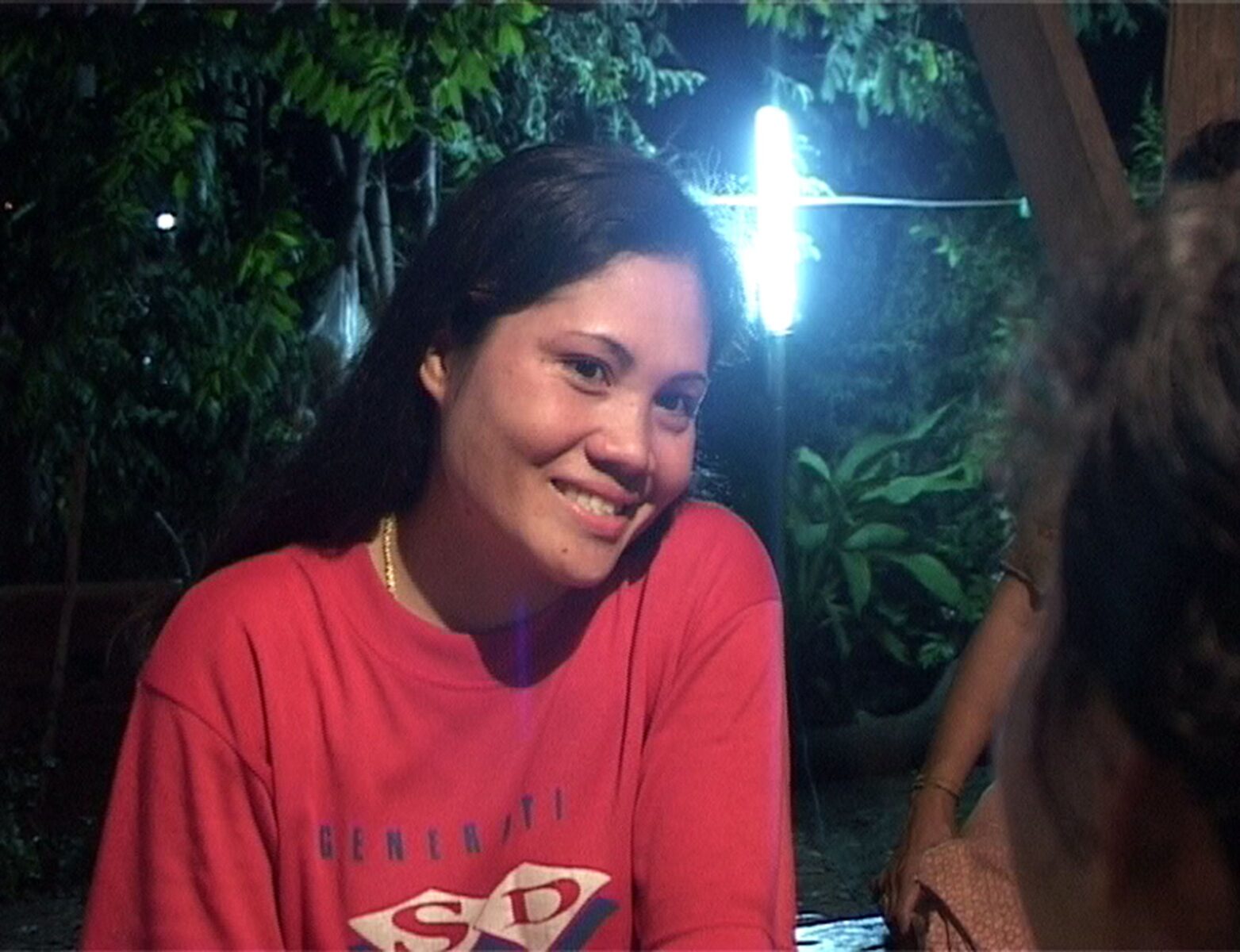
Haunted Houses.
Trailer for CinDi
Apichatpong Weerasethakul, 2011, South Korea, 2m
A special trailer produced by Apichatpong for the 2011 edition of the Cinema Digital Seoul Film Festival (CinDi).
Ashes
Apichatpong Weerasethakul, 2012, Thailand, 20m
Everyday details are captured with a strong sense of intimacy and the certainty of fading into obscurity.
Vampire
Apichatpong Weerasethakul, 2008, Thailand, 19m
The dream of a rare (or perhaps imaginary) bird that lives on the border between Thailand and Myanmar.
Haunted Houses
Apichatpong Weerasethakul, 2001, Thailand, 60m
Apichatpong casts a shifting assortment of villagers to perform a script pulled from a popular Thai military TV show about the trials and tribulations of the wealthy.
Sunday, May 7 at 3:00pm
Saturday, May 13 at 9:00pm
Shorts Program 3: Luminous Empire
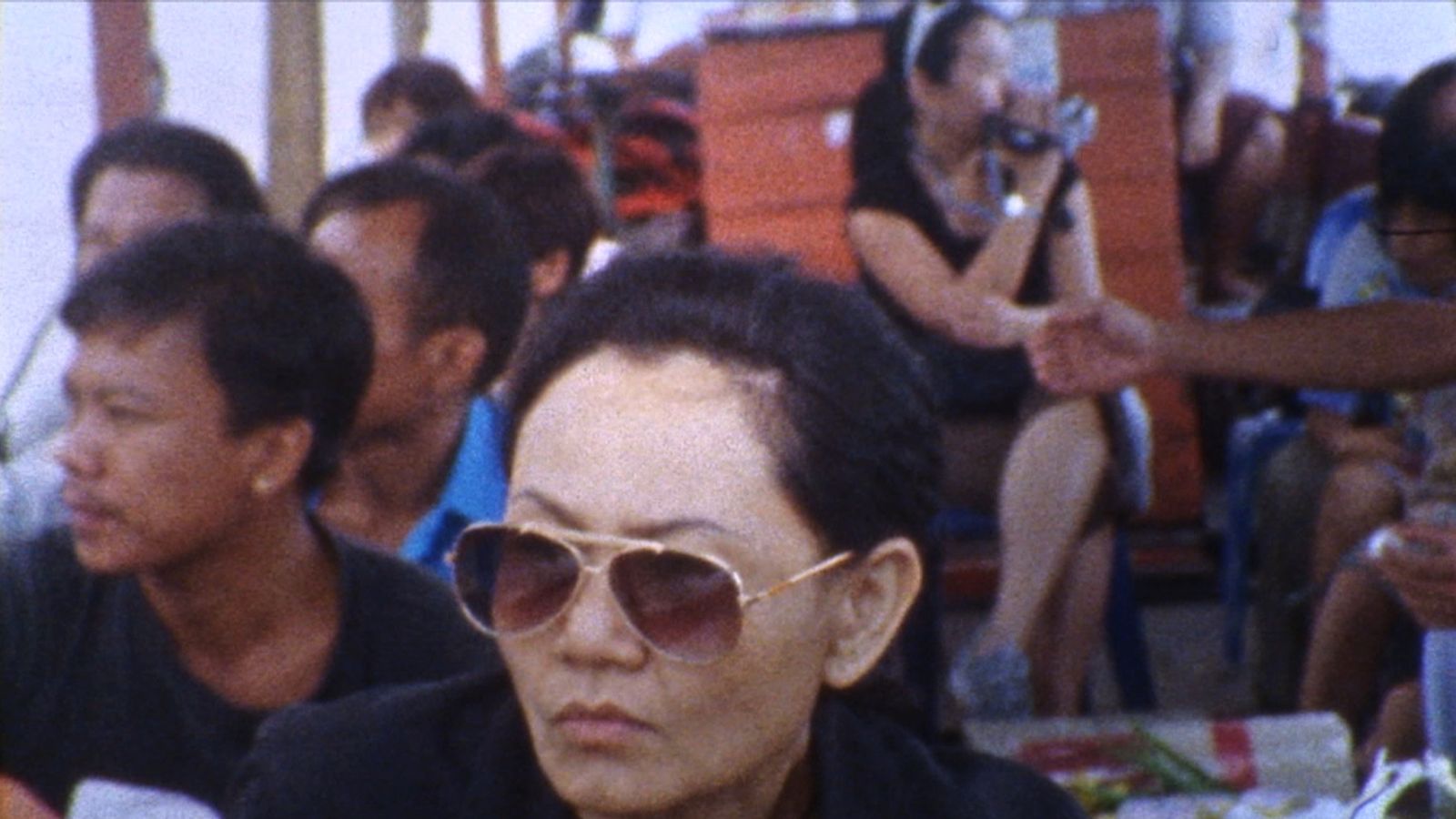
Luminous People.
thirdworld
Apichatpong Weerasethakul, 1997, Thailand, 17m
A study of the landscape of Ko Panyi, a small island in southern Thailand.
Empire
Apichatpong Weerasethakul, 2010, Thailand/Austria, 2m
A camera traces the obscure contours of a cave as a white-helmeted diver searches it for something.
My Mother’s Garden
Apichatpong Weerasethakul, 2007, Thailand/France, 7m
An impressionistic study of a jewelry collection by Victoire de Castellane, and a tribute to the small details of Apichatpong’s mother’s garden.
Ghost of Asia
Apichatpong Weerasethakul and Christelle Lheureux, 2005, Thailand/France, 9m
A ghost wanders the beaches of Thailand, and the filmmakers recruit a pair of local children to direct the rest of the film for them.
Monsoon
Apichatpong Weerasethakul, 2011, Thailand, 3m
A response to the 2011 Tohoku earthquake in Japan, in which a man Skypes his partner on the other side of the world and discovers a firefly.
Luminous People
Apichatpong Weerasethakul, 2007, Thailand/Portugal, 15m
Through dramatic reenactment, tribute is paid to the presence of the dead and vanishing memories of the living.
Nimit
Apichatpong Weerasethakul, 2007, Thailand, 16m
What began as an effort to make a film about the king of Thailand mutates into a film about Apichatpong’s family, friends, lover, and cherished landscapes.
Blue
Apichatpong Weerasethakul, 2018, France, 12m
A dance of backdrop scrolls takes place as a woman lies awake in bed on the threshold between dream and reality.
A Letter to Uncle Boonmee
Apichatpong Weerasethakul, 2009, Thailand/Germany, 18m
A filmed letter to the protagonist of Uncle Boonmee Who Can Recall His Past Lives prior to that film’s production captures some houses in Nabua in the Philippines that might be used as the character’s home in the forthcoming feature.
Sunday, May 7 at 6:30pm
Sunday, May 14 at 3:30pm
Shorts Program 4: Vapour Lights
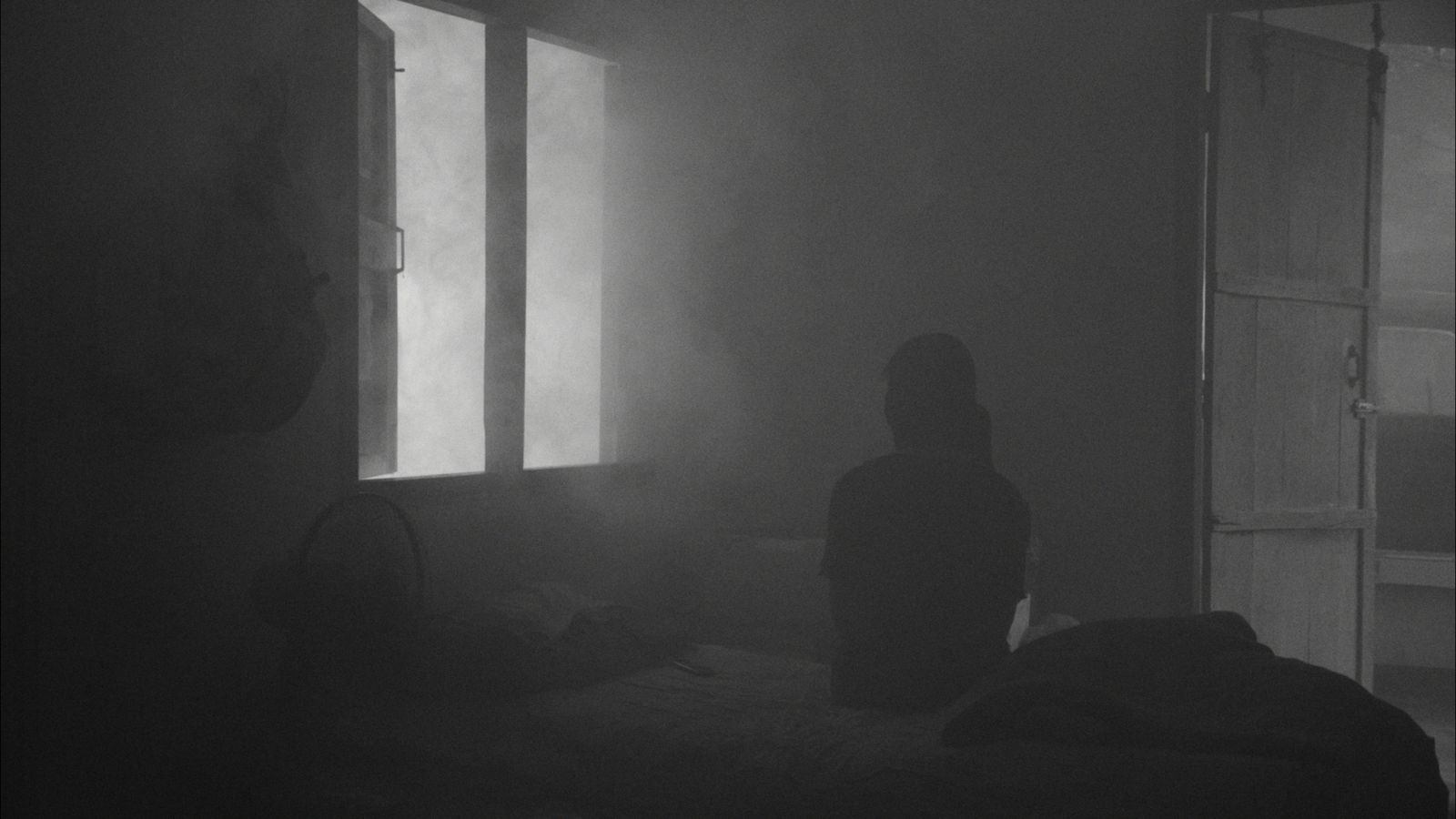
Vapour.
This and a Million More Lights
Apichatpong Weerasethakul, 2003, Thailand, 1m
Strobing light fragments scenes from a public swimming pool.
Malee and the Boy
Apichatpong Weerasethakul, 1999, Thailand, 27m
A meditation on image and sound in which a 10-year-old boy wanders around Bangkok with a microphone in search of sounds to accompany the filmmaker’s footage.
Nokia Short
Apichatpong Weerasethakul, 2003, Thailand, 2m
A test with the integrated camera of a Nokia cell phone.
Vapour
Apichatpong Weerasethakul, 2015, Thailand, 21m
A vast cloud of fog settles upon Toongha in Thailand, engulfing the entire village in an oneiric atmosphere.
Ablaze
Apichatpong Weerasethakul, 2016, Thailand, 5m
Shadow play takes on a painterly aspect in this study of two figures: a woman and a man who insistently blocks her vision.
Mekong Hotel
Apichatpong Weerasethakul, 2012, Thailand/U.K., 56m
Set in a hotel on the Mekong River on the border between Thailand and Laos, this mid-length film alternates freely between fiction and documentary and between a pair of young lovers, a vampiric mother and her daughter, and the flow of the river itself.
Sunday, May 7 at 8:45pm
Sunday, May 14 at 8:45pm
Apichatpong Weerasethakul Selects
Boy
Nagisa Oshima, 1969, Japan, 35mm, 97m
Japanese with English subtitles
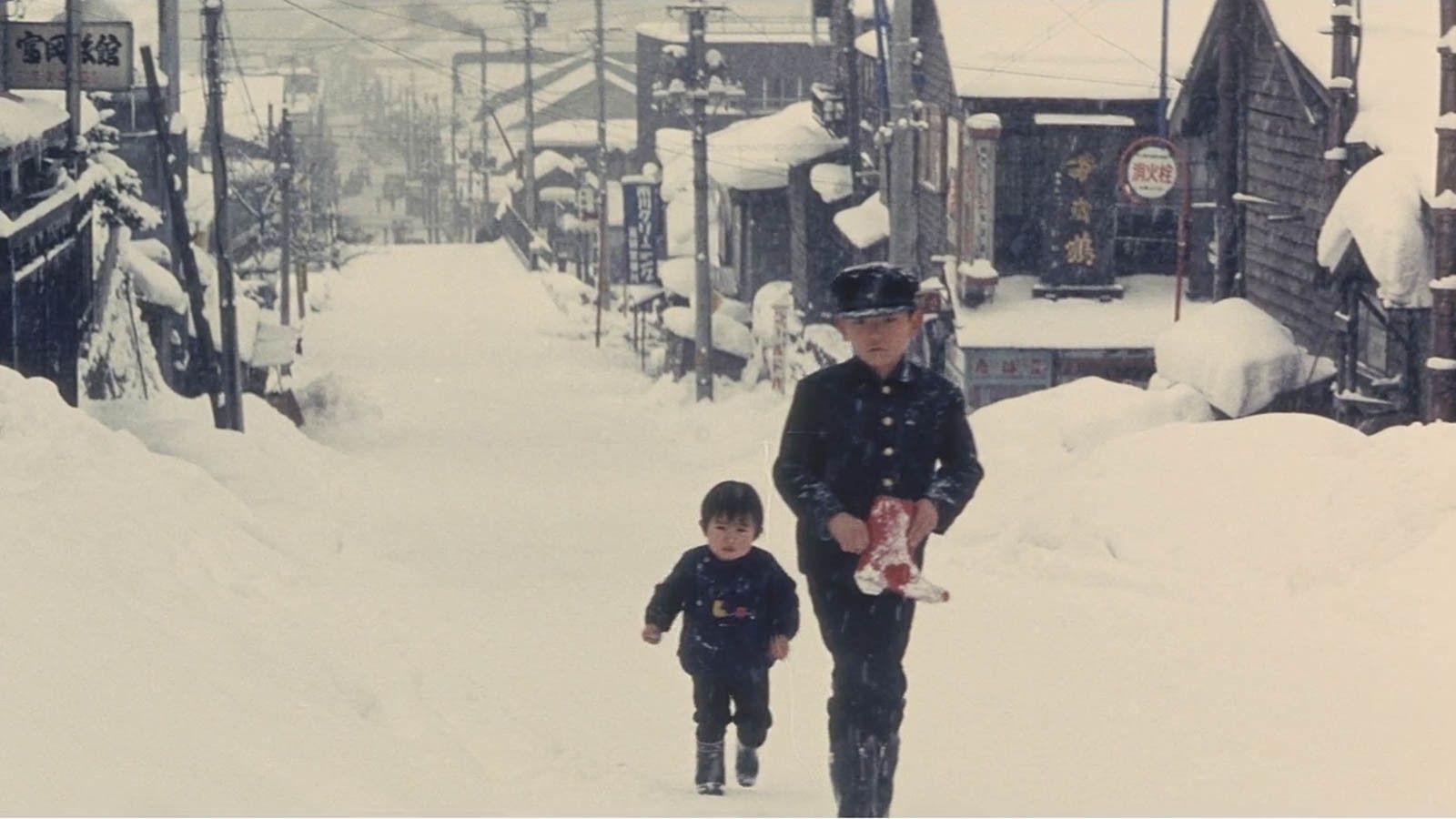
Boy. Courtesy of Janus Films.
Among the most fascinating films by one of Japanese cinema’s all-time great iconoclasts, Boy is a dark comedy that arrives at some provocative conclusions about the effects of capitalism on the family unit. The titular young lad, 10-year-old Toshio (Tetsuo Abe) belongs to a family of grifters who make a living through automobile-accident scams: one member of the family stages themselves getting hit by a car, and the family then extracts a settlement payment from the unnerved driver. But when the young boy proves himself something of a virtuoso at perpetrating the aforementioned scam, a nation-spanning road trip to profit off of Toshio’s gifts turns into an increasingly tense flight from the cops. A comic moral tale based on a true story and chock-full of formal ideas, Boy counts among Oshima’s signature works. An NYFF7 Main Slate selection.
“I haven’t seen this film, but I chose it for the love of Oshima and it’’s a rare opportunity to see it on the big screen. This selection complements Imamura’’s A Man Vanishes and Kiarostami’’s Homework, both of which play with the concept of reality in cinema and in life.” – Apichatpong Weerasethakul
Friday, May 12 at 3:30pm
Saturday, May 13 at 3:00pm
La Captive
Chantal Akerman, 2000, France/Belgium, 118m
French with English subtitles
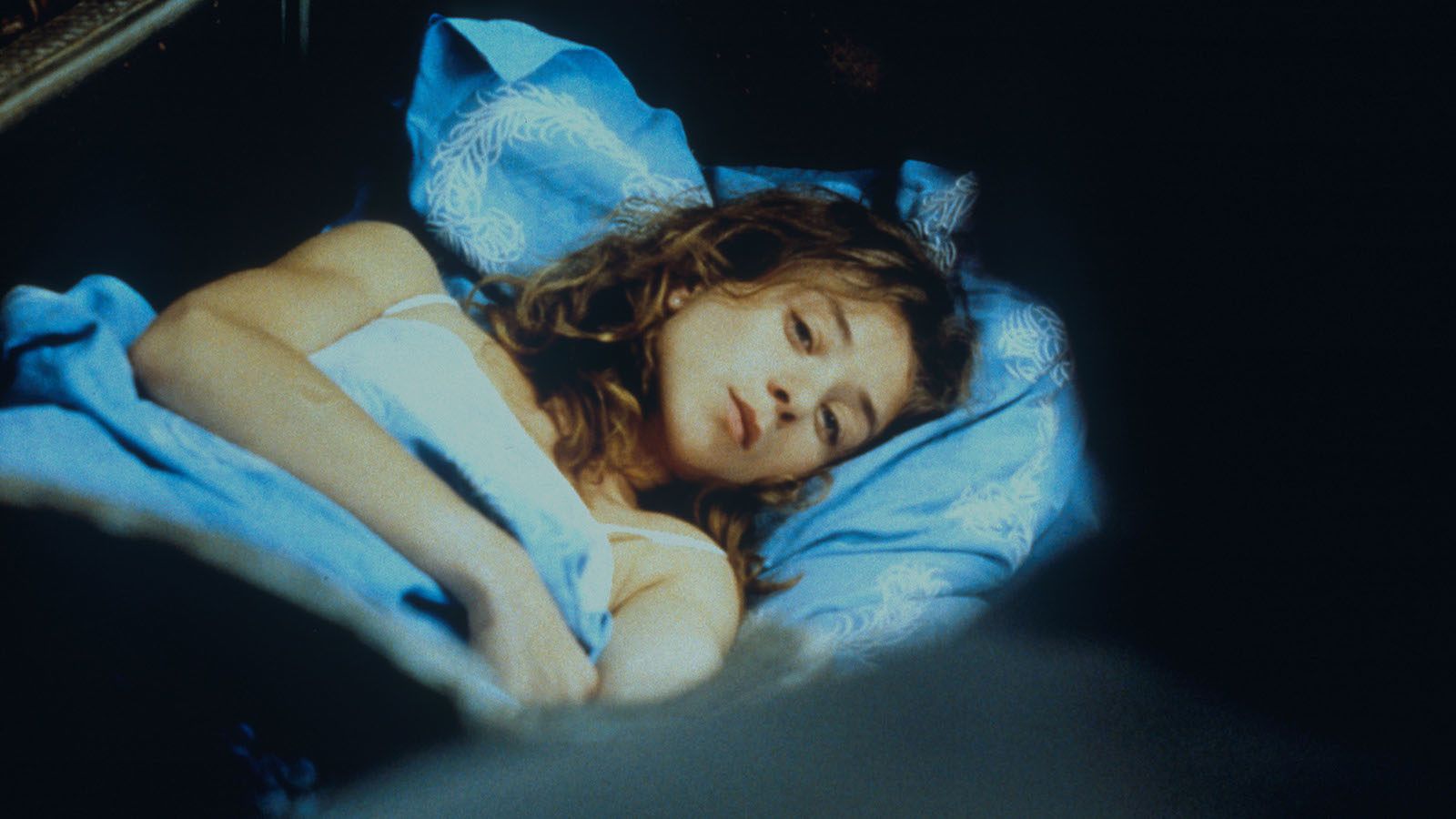
La Captive. Courtesy of Belgian Royal Cinematheque.
Chantal Akerman’s hypnotic exploration of erotic obsession plays like Vertigo filtered through the director’s visionary feminist formalism. Loosely inspired by the fifth volume of Proust’s In Search of Lost Time, it circles around the very-strange-indeed relationship between the seemingly pliant Ariane (Sylvie Testud) and the disturbingly jealous Simon (Stanislas Merhar), whose need to possess her completely renders him hostage to his own destructive desires. The coolly contemplative camera style of Sabine Lancelin imparts an unbroken, trance-like tension, which finds release only in the thunderous roil of the operatic score. DCP courtesy of Cinémathèque Royale de Belgique.
“I didn’t see a lot of Akerman’’s movies. However, I consider her films to be an evolution of the suspense films I grew up watching. She stares at the human being’’s continually shifting feelings and desires with the intensity of a sharp sword.” – Apichatpong Weerasethakul
Friday, May 5 at 3:30pm
Tuesday, May 9 at 9:00pm
Careful
Guy Maddin, 1992, Canada, 35mm, 100m
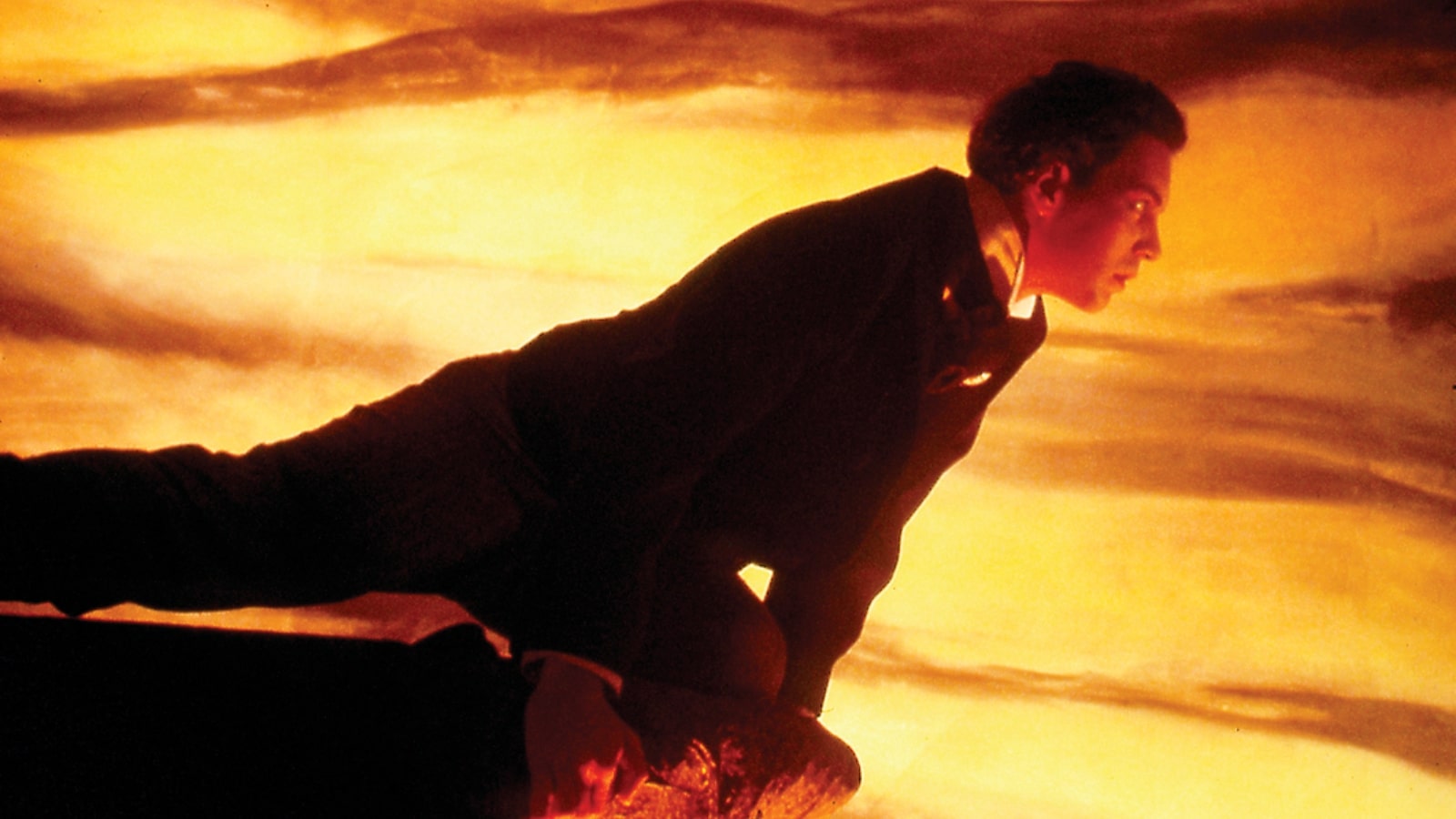
Careful. Courtesy of Zeitgeist Films.
In the mythic mountain village of Tolzbad—where even the slightest disturbance can trigger a deadly avalanche—residents are brought up to be as careful, quiet, and unobtrusive as possible. But in this world of strict repression, a Freudian pileup of incestuous desires, sibling rivalries, and patricidal plots threatens to bury them all…. Drawing as much on the aesthetics of German silent Eexpressionism as on the avant-garde camp provocations of Kenneth Anger and Jack Smith, neo-primitivist visionary Guy Maddin crafts a hallucinatory parable of pent-up passions run amok that unspools like a demented cautionary tale from a lost civilization. An NYFF30 Main Slate selection.
“Watching Careful is like observing a dream from an ancient time. A mash-up of mysteries and manners. Guy Maddin, I believe, is one of the masters who is dissatisfied with today’s film landscape. He likes to return to cinematic treasure chests and speculate on their various evolutionary paths. Careful is a powerful declaration of resistance.” – Apichatpong Weerasethakul
Saturday, May 6 at 3:00pm
Faster, Pussycat! Kill! Kill!
Russ Meyer, 1965, USA, 35mm, 83m
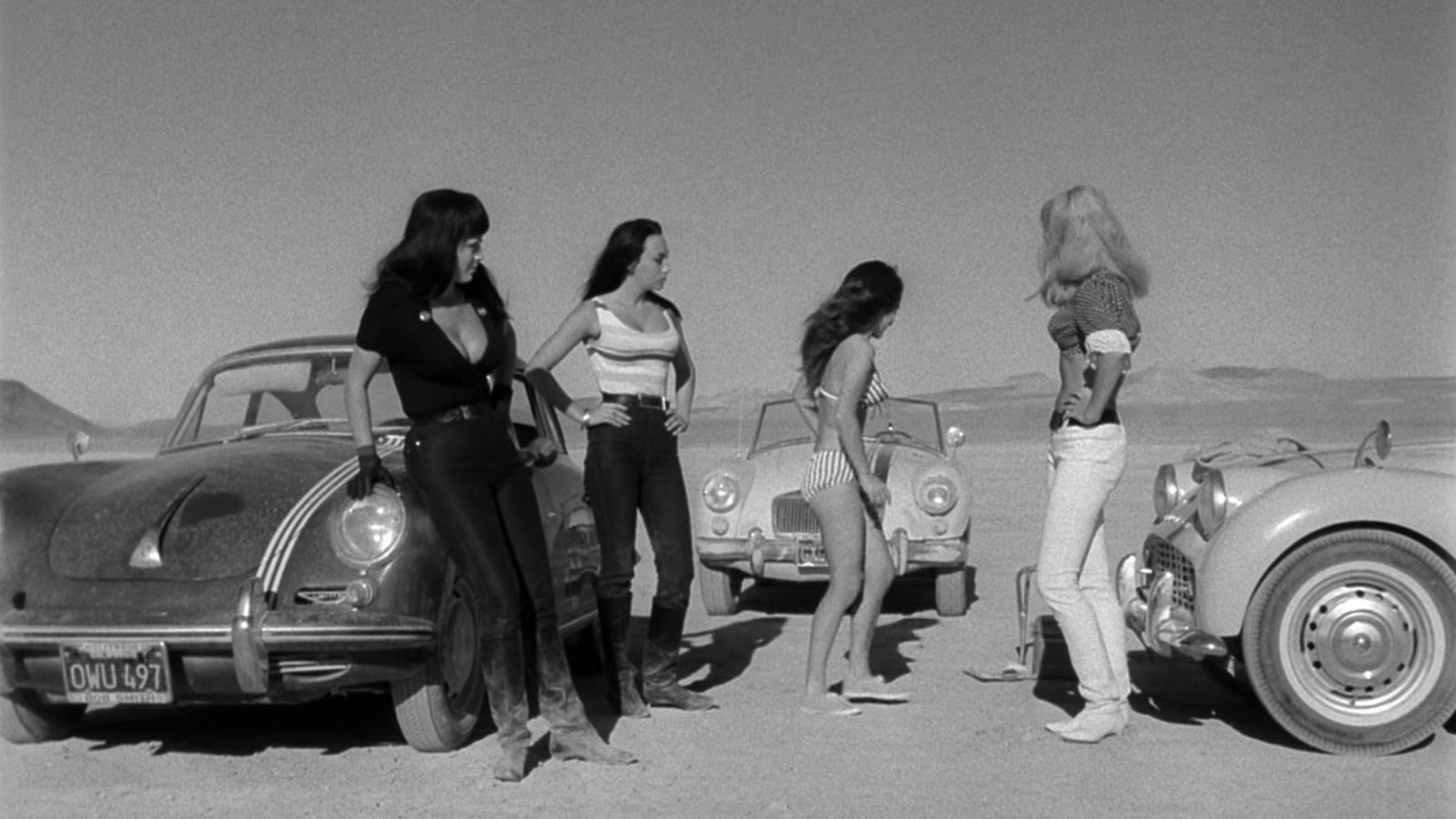
Faster, Pussycat! Kill! Kill!. Courtesy of RM Films.
In Russ Meyer’s enduringly influential, black-and-white cult classic, three go-go dancers (Lori Williams, Haji, and Tura Satana) tear across the California desert on a nihilistic crime spree, a rampage saturated in attitude, style, and an insatiable hunger for thrills, no matter how violent. Meyer wrote, directed, and edited Faster, Pussycat! Kill! Kill!, but the show is stolen by the trio of women at its core, who uncork outrageous line deliveries and anchor much of the film’s iconic imagery. A deliriously overdetermined time-bomb of a movie, Faster, Pussycat! Kill! Kill! remains one of cinema’s most gleefully subversive road films. Courtesy of the Museum of Modern Art.
“The film’s black and white imagery makes me feel like I’m watching a movie shot on an alien planet. It reminds me of several Thai exploitation films that followed in its footsteps, but with less bravery and lunacy. This film is a mothership.” – Apichatpong Weerasethakul
Friday, May 12 at 9:15pm
Homework
Abbas Kiarostami, 1989, Iran, 86m
Farsi with English subtitles
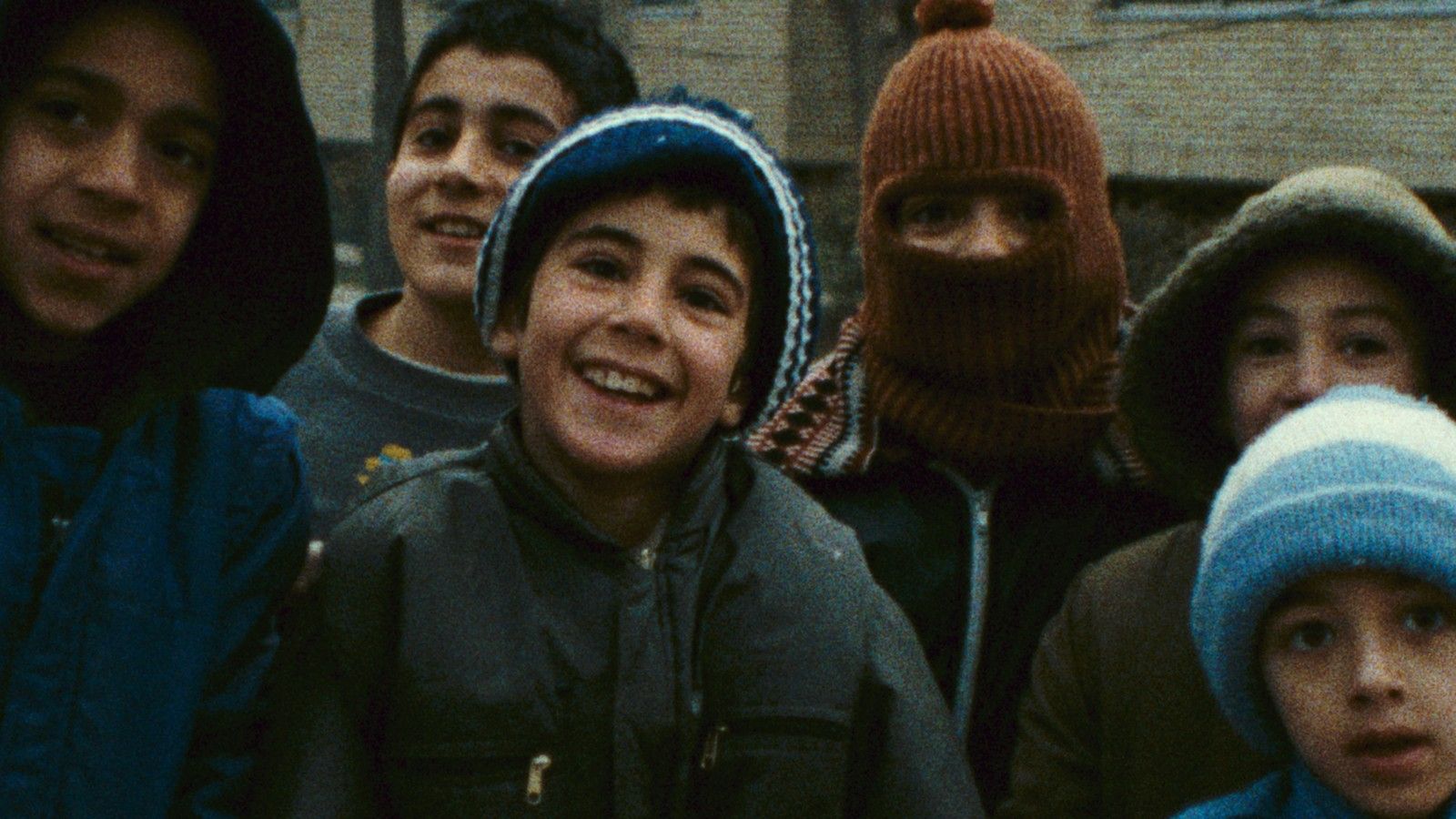
Homework. Courtesy of Janus Films.
Abbas Kiarostami described his ninth feature not as a film, but rather as a filmed inquiry motivated by the semi-explicable problems that his own children brought home every night from school. In the delightful result, young scholars are questioned on camera by Kiarostami himself; with their backs to the wall, framed in close-up, they face the camera and talk about excessive amounts of homework, the allure of TV cartoons, and the lingering promise of punishment that hovers over any possible youthful temptation. A characteristically playful and philosophical examination of modern methods of education, Homework finds Kiarostami at his most curious and compassionate.
“As I was watching this film, I was transported back to my school years. We learned how to negotiate for our position through rewards and discipline. The film is about authority and how people express themselves while being watched. A camera is also one of the commanding powers in the picture. I have my doubts that this piece is entirely nonfiction. However, one of the ideas of this film, or of cinema in general, is manipulation. This mirror-like image is captivating.” – Apichatpong Weerasethakul
Tuesday, May 9 at 4:00pm
Sunday, May 14 at 6:30pm
I Walked with a Zombie
Jacques Tourneur, 1943, USA, 35mm, 69m
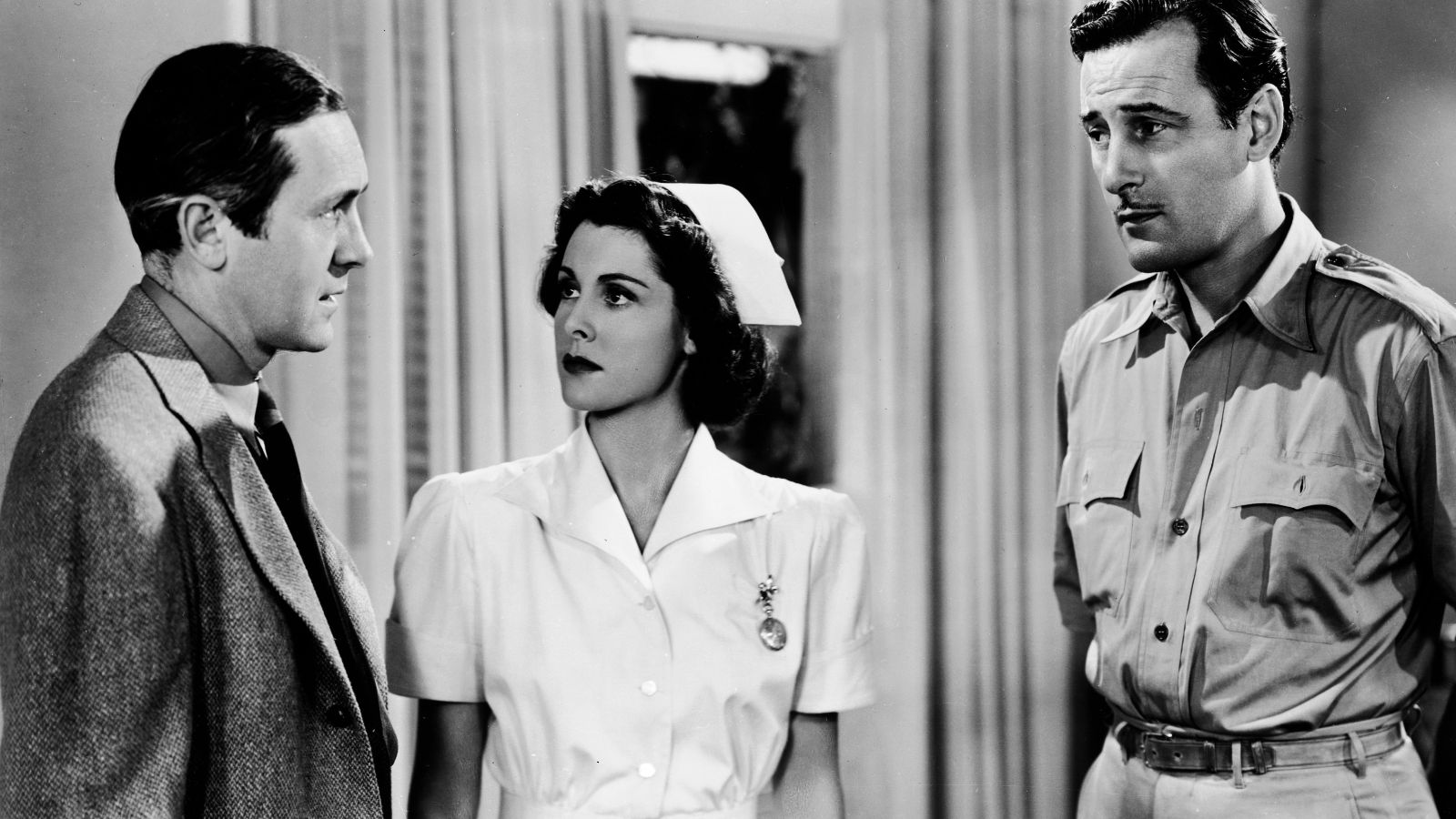
I Walked with a Zombie. Courtesy of WB/Park Circus.
In Jacques Tourneur’s second collaboration with producer Val Lewton, a Canadian nurse working on an island in the West Indies turns to voodoo with the hope of curing her patient. Loosely based on Charlotte Brontë’s Jane Eyre, I Walked with a Zombie features a quite peculiar kind of romance and is perhaps Tourneur’s most poetic film: a haunting, audacious studio picture that presents a complex meditation on colonialism and our relationship with the past, as seen here through the living’s uncanny connection to the dead.
“For me, this is one of the most beautiful black-and-white films ever made. A white lady in a trance walks through the sugar plantation, drawn by the sound of the drum and the sea waves. Every time I see it, I see something different: a dream of independence, a primitive science fiction, and a fear of others. I also enjoy the film’s silent moments. Previously, they did not need to fill in all of the sound components in order to captivate the audience.” – Apichatpong Weerasethakul
Thursday, May 4 at 9:30pm (Introduction by Apichatpong Weerasethakul)
Thursday, May 11 at 4:30pm
A Man Vanishes
Shōhei Imamura, 1967, Japan, 130m
Japanese with English subtitles
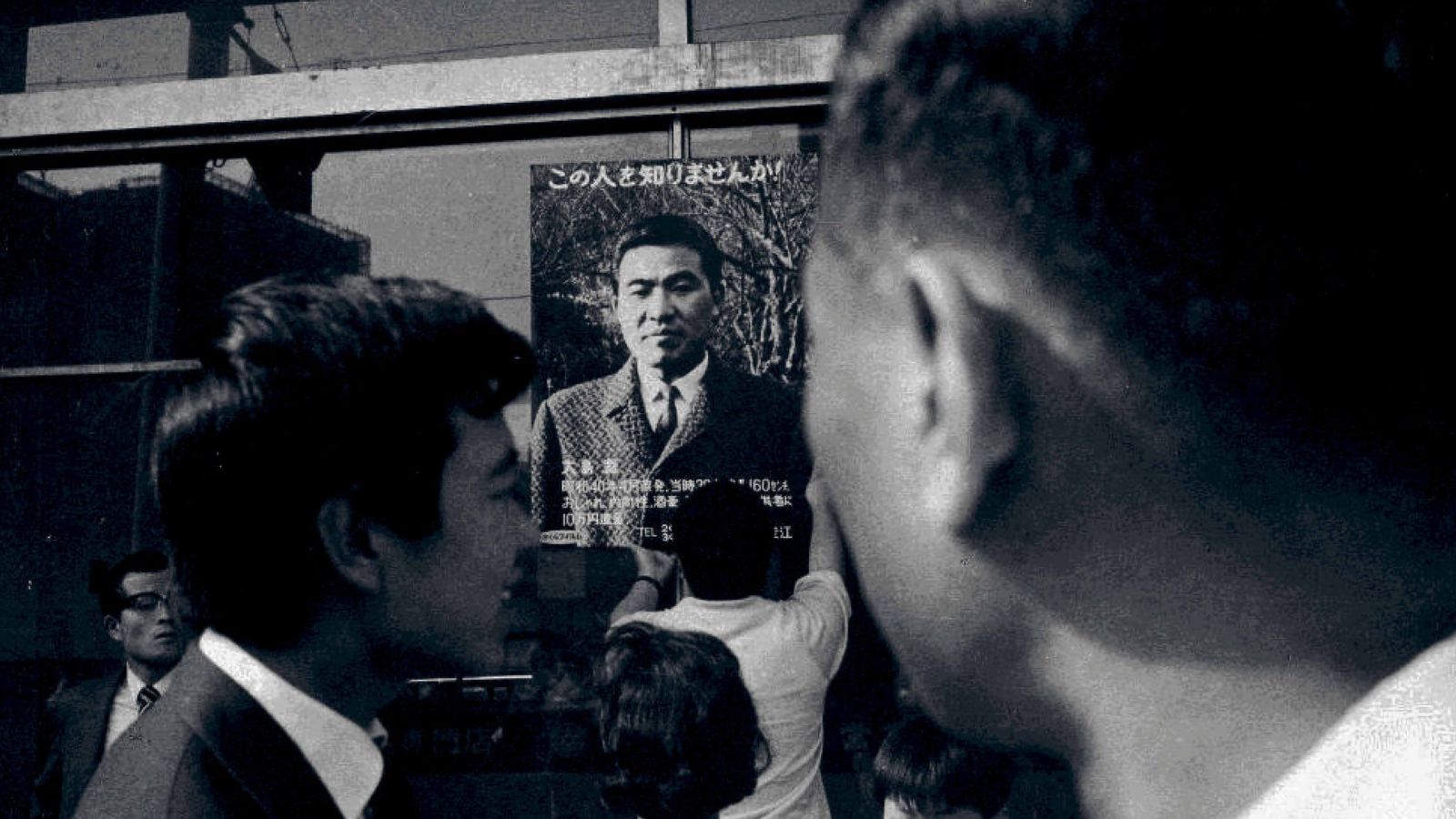
A Man Vanishes. Courtesy of Icarus Films.
An essential work of cinematic nonfiction that pushes the envelope of what is possible in documentary filmmaking, A Man Vanishes ranks among the greatest and most radical achievements by seminal Japanese director Shōhei Imamura, and one of the most vital investigations into cinema’s relationship with the concept of truth. Taking the sudden disappearance of a handsome businessman as their initial point of departure, Imamura and his crew follow the man’s fiancee as she searches high and low for her missing partner—but the deeper Imamura and company delve into this case, the more they find themselves lost in a labyrinth where the distinction between fiction and reality breaks down and nothing is what it seems.
“I watched this film in the 1990s, with the boom of Iranian cinema that explored the line between reality and fiction. These films, along with Cassavetes’, have inspired me to explore the borders of filmmaking in the relationship between the director, the cast, and the audience. At certain points in A Man Vanishes, it doesn’t matter if the scene is real. We realize that cinema, by nature, is a documentary of man and how he looks.” – Apichatpong Weerasethakul
Friday, May 5 at 9:30pm (Introduction by Apichatpong Weerasethakul)
Friday, May 12 at 12:30pm
Opening Night
John Cassavetes, 1977, USA, 144m
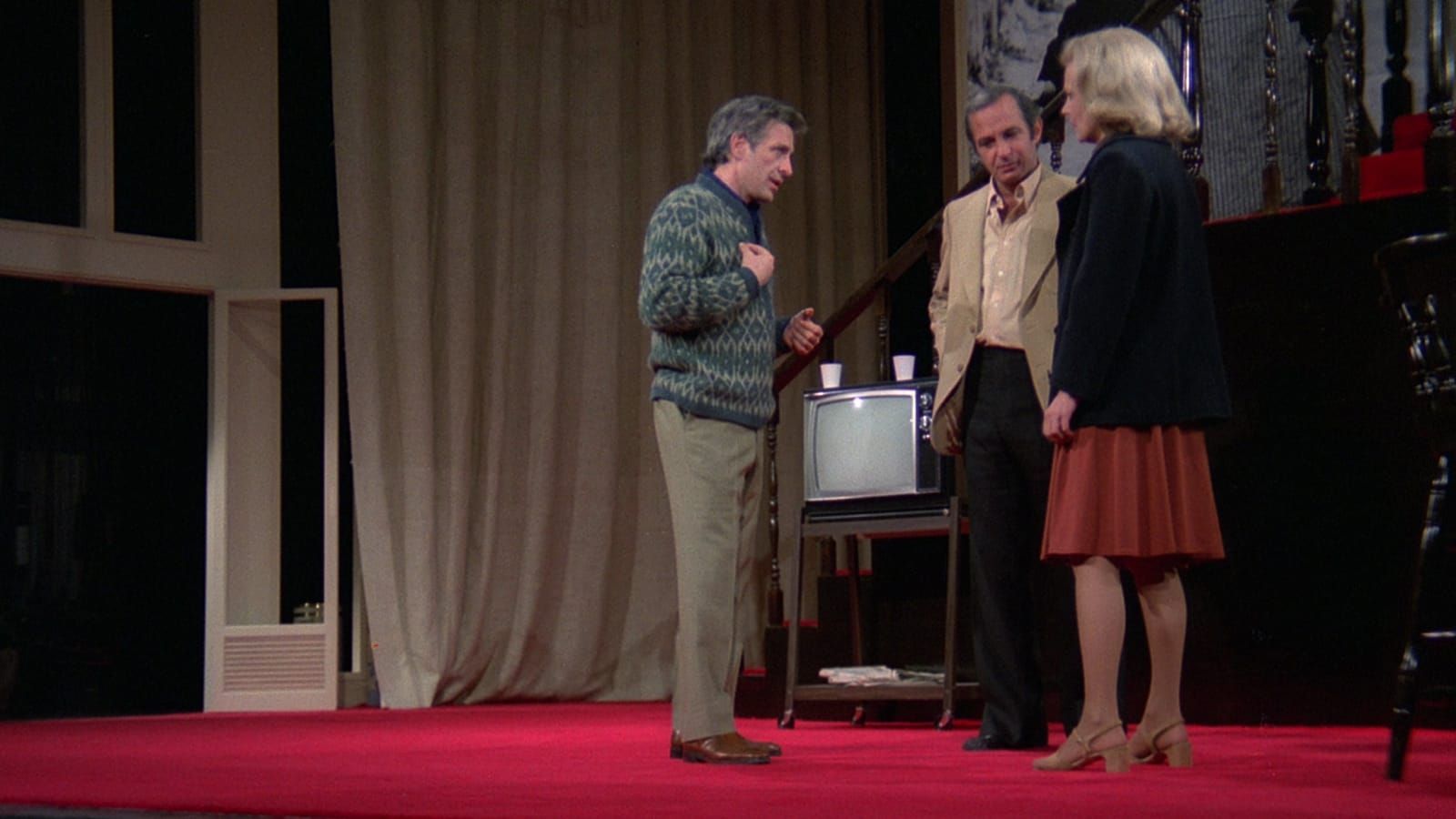
Opening Night. Courtesy of AGFA.
John Cassavetes’s gale-force, exposed-nerve psychodrama plunges headlong into the art and mysteries of acting. In one of her finest whirlwind, woman-under-the-influence performances, Gena Rowlands plays an aging stage star in the midst of preparing for a new role whose sense of self begins to crumble after she witnesses the car-accident death of an obsessive fan. Scrambling the boundaries between art and life, rehearsals and reality, Cassavetes leads his fearless band of actors into ever more vulnerable and startling realms of emotional honesty. Opening Night attracted little attention upon its U.S. release (save for Cassavetes’s most devoted followers), opening in December 1977 to poor box-office and tepid reviews. Months later it had its international debut at the 1978 Berlinale, where the filmmaker received a nomination for the Golden Bear and Rowlands won best actress. An NYFF26 Main Slate selection.
“I’ve always admired John Cassavetes’ ability to blend the dynamics of daily life, work, and fiction. He ‘lived’ cinema. His relationship with Gena Rowlands produces a grand love diary. My favorites of his are Opening Night and Love Streams.” – Apichatpong Weerasethakul
Thursday, May 4 at 3:00pm
Sunday, May 14 at 12:30pm
Primate
Frederick Wiseman, 1974, USA, 16mm, 105m
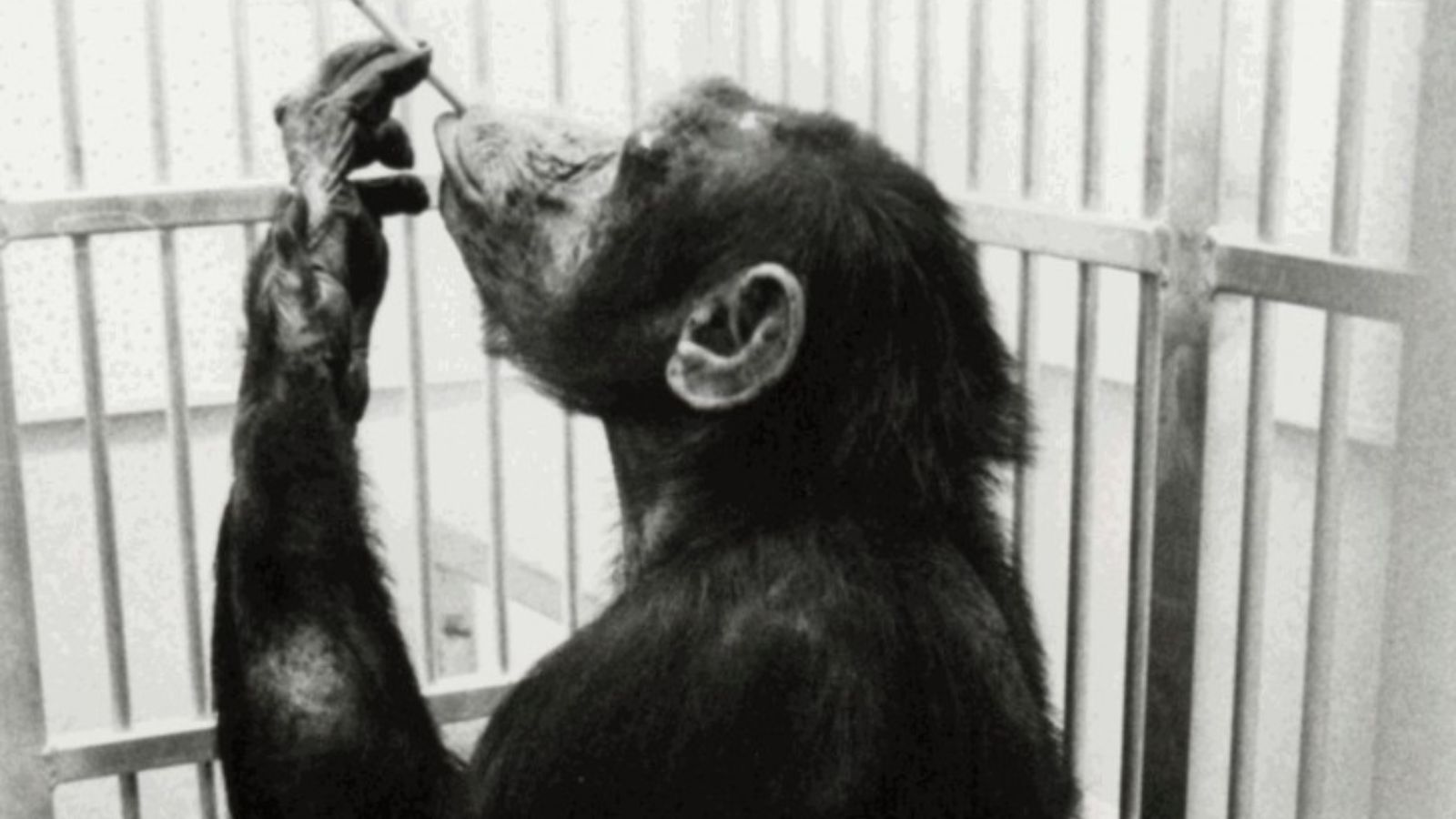
Primate. Courtesy of Zipporah Films.
Frederick Wiseman brings his incomparable powers of observation to bear on the animal kingdom in his 10th feature, chronicling the daily activities and experimental research undertaken by scientists at Atlanta’s Yerkes National Primate Research Center. As the affable scientists test their simian subjects’ capacities to learn, harbor memories, and develop linguistic skills, as well as their behavioral responses to drugs and alcohol, Primate peers beyond the zoological curtain to reveal Wiseman’s underlying concerns—namely, in whose service is this research actually being conducted, to what ends, and what to make of the fraught interspecies power dynamics this research embodies? The result, as ever with Wiseman’s work, is a vital inquiry into scientific ethics and humans’ relations with their fellow inhabitants of the Earth.
“Frederick Wiseman’s films are organic, reflective of human experience. My mind is in a meditative state, aware of the act of looking, of being… the subjects, man – animals. To me, his works evoke the same emotion as Warhol’s.” – Apichatpong Weerasethakul
Thursday, May 11 at 9:15pm (Screening will take place at the Elinor Bunin Munroe Film Center, 144 W. 65 St.)
The Puppetmaster
Hou Hsiao-hsien, 1993, Taiwan, 35mm, 144m
Mandarin and Japanese with English subtitles
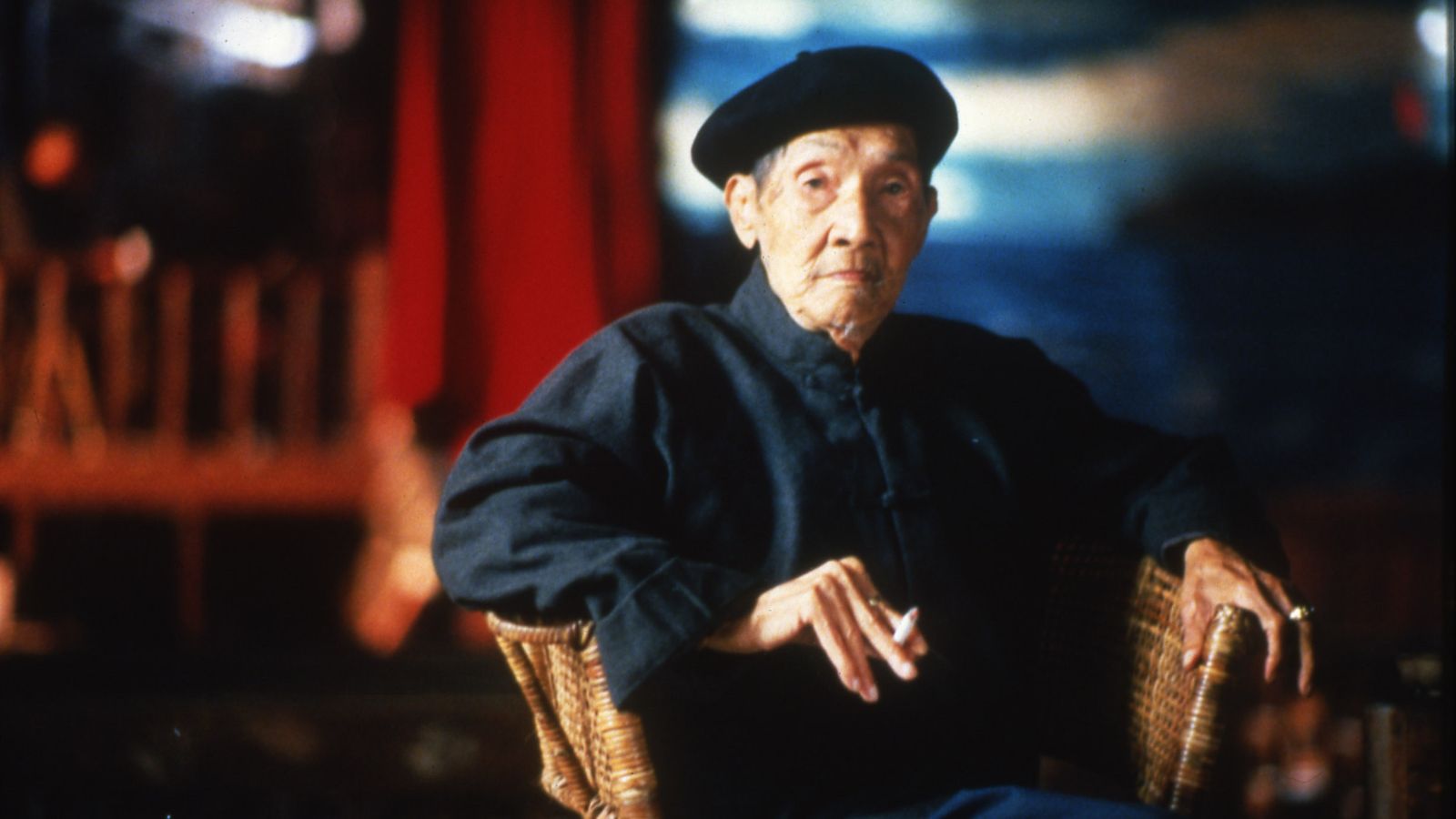
The Puppetmaster.
The life of an 84-year-old puppeteer serves as a map of the first half of the 20th century in Hou Hsiao-hsien’s 1993 masterpiece. Li Tien-lu (who appears as himself) recounts his life, as the film dances between scenes of his youth, his entry into the marionette profession, and the period when his skills were much in demand by the Japanese imperial government occupying Taiwan during World War II. Li is a witness to history who himself becomes swept up in its convolutions, and the consummately atmospheric The Puppetmaster uses his biography to evoke the often melancholy consequences of time’s march forward, chronicling the rise and fall of political regimes and cultural traditions from the oblique perspective of a single man adrift on the tides. An NYFF31 Main Slate selection.
“This is one of a few films that I consider to be the peak of my film-watching experience. I abandoned my quest for understanding and recognized that the film was very simple. A man’s recollection is accompanied by vignettes of window frames, doors, and stages bathed in sunlight. Hou’s films always bring back memories of youth. They treat the audience with respect. Nowadays, I rarely come across delicate cinema like this.” – Apichatpong Weerasethakul
Saturday, May 6 at 8:00pm (Introduction by Apichatpong Weerasethakul)


